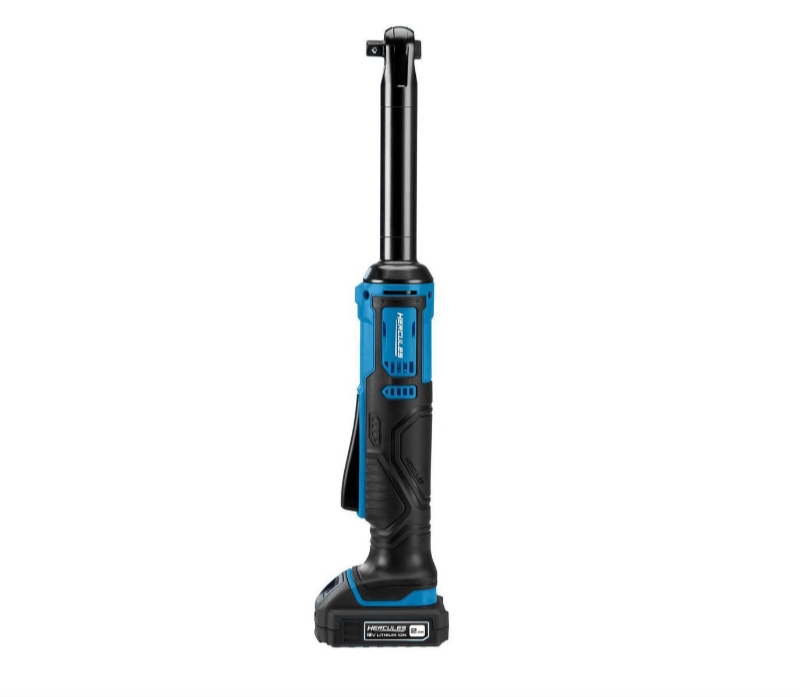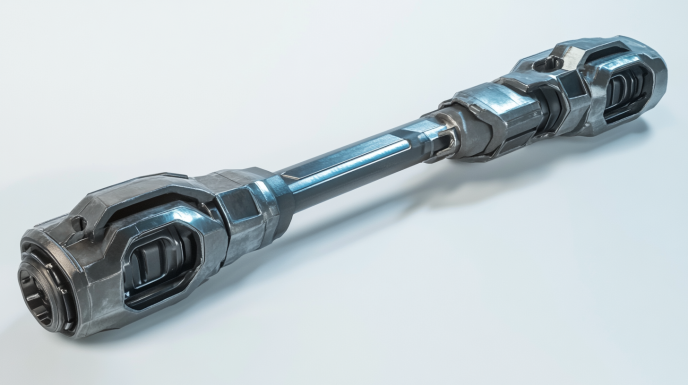
HERCULES 12V Cordless 3/8 in. Extended Reach Ratchet – Tool Only
- The HERCULES™ 12V Cordless 3/8 in. Extended Reach Ratchet delivers the power and speed of a pneumatic ratchet. The high power motor delivers 40 ft. lbs. of max torque at speeds of 275 RPM to remove the most stubborn fasteners. The compact, slim profile makes this ratchet wrench ideal for using in extra tight engine bays. Pair up with the HERCULES™ 2.0 Amp Hour battery pack to deliver more work per charge and more work over the life of the pack.
- 4 in. extended neck for greater accessibility in hard-to-reach areas
- 40 ft. lbs. of max torque and 275 RPM for the power and speed of a pneumatic ratchet
- All metal gearing for long tool life
- Built-in LED illuminates work area
- Reinforced steel housing for added durability and strong cranking force
- Oversized FWD/REV switch is easy to use wearing gloves
- Compact slim profile for use in extra-tight engine bays
- Rubberized overmold grip for ultimate comfort
- Variable speed paddle trigger for maximum control
$54.99
I still remember the frustration of stripped bolts and sore wrists after a long weekend working on my brother’s Chevy. Manual ratchets had served me well for years, but as projects grew more ambitious, I knew I needed something better. That’s when I discovered what would become my workshop MVP – the Hercules 12V Ratchet. What started as a casual purchase has evolved into a genuine appreciation for this versatile tool, and today, I’m sharing everything I’ve learned about it over the past year of daily use.
The Moment Everything Changed
It was a rainy Saturday afternoon when I first walked into Harbor Freight, simply browsing with no intention to buy anything. The distinctive blue of the Hercules line caught my eye, and there it was – compact, professional-looking, and surprisingly affordable. I’m generally skeptical about power tools in this price range, but something about this one convinced me to take a chance.
Looking back now, that impromptu purchase may have been one of the best decisions I’ve made for my DIY projects. The Hercules 12V Ratchet has completely transformed how I approach mechanical work, saving me countless hours and preventing the hand fatigue that used to cut my repair sessions short.
What Exactly Is the Hercules 12V Ratchet?
For those unfamiliar with electric ratchets, think of it as the perfect middle ground between a manual socket wrench and a full-blown impact driver. The Hercules 12V Ratchet is essentially a battery-powered socket wrench that does the repetitive turning for you, while still allowing for manual fine adjustments when needed.
Unlike bulkier power tools, this ratchet maintains a slim profile that can access tight spaces – a critical feature when you’re working under a dashboard or deep in an engine bay. It’s designed specifically for automotive and general mechanical work where torque requirements are moderate but space is often limited.
The tool features a 3/8-inch square drive (though adaptors can easily make it compatible with other sizes), a comfortable pistol grip design, and runs on Hercules’ 12V battery platform. What makes it stand out from manual alternatives is simple: it delivers consistent power without requiring you to constantly reposition your hand or strain your wrist through repetitive motions.
Where to Find Your Own Hercules 12V Ratchet
After testing this tool extensively, I can confidently say it’s worth tracking down. The Hercules 12V Ratchet is exclusively available at Harbor Freight stores nationwide or through their website. This exclusivity is actually part of why the price remains competitive – Hercules is Harbor Freight’s premium in-house brand, designed to compete with more expensive professional-grade tools while maintaining accessibility for DIYers and budget-conscious pros.
I’ve found that Harbor Freight regularly runs promotions on their Hercules line, so timing your purchase around major holidays can save you even more. They also occasionally offer bundle deals that include batteries or additional accessories at a discount.
If you’re considering ordering online, Harbor Freight typically offers free shipping on orders over a certain amount, and they’ve improved their delivery times significantly in recent years. That said, I always prefer visiting the store in person when buying tools – there’s something about holding it, feeling the weight and balance that helps confirm it’s right for your needs.
Price Point: Is It Worth the Investment?
Let’s talk dollars and cents. At the time of writing, the Hercules 12V Ratchet retails for approximately $99.99 for the bare tool. If you need the complete kit with battery and charger (which I highly recommend for first-time Hercules buyers), expect to pay around $139.99.
Is this expensive? Compared to a quality manual ratchet at $30-50, it might seem so initially. However, when you consider comparable electric ratchets from brands like Milwaukee or MAC, which can run $180-300 for similar specifications, the Hercules suddenly becomes a compelling value proposition.
After a year of regular use, I can confidently say the time saved and the reduced physical strain have more than justified the cost for me. Just this past weekend, I replaced the alternator in my Subaru in half the time it would have taken with manual tools. For weekend warriors and professional mechanics alike, the price-to-performance ratio is exceptional.
The Impressive Features That Make It Stand Out
What makes this tool worth the investment? Let me break down the key features that have impressed me the most:
Compact Design With Impressive Power
The Hercules measures just 11.2 inches in length, with a head height of approximately 2 inches. This compact form factor allows it to access areas where larger power tools simply can’t go. Despite its size, it delivers a respectable maximum torque of 45 ft-lbs – more than enough for most fasteners you’ll encounter in automotive and general repair work.
Ergonomic Comfort
The overmolded rubber grip provides excellent control and reduces fatigue during extended use. The balance point is perfectly positioned so the tool doesn’t feel awkward or front-heavy like some competitors. The trigger is responsive without being too sensitive, allowing for precise control of speed.
Variable Speed Control
One feature I’ve come to appreciate is the variable-speed trigger, which gives you control from 0-170 RPM. This precision is invaluable when starting or finishing bolts, or when working with delicate components. Many cheaper electric ratchets offer only single-speed operation, so this represents a significant advantage.
Practical Built-In LED Work Light
The integrated LED work light may seem like a minor addition, but it’s proven invaluable countless times when working in dimly lit engine bays or underneath vehicles. The light activates with a slight trigger pull before the ratchet begins rotating, allowing you to illuminate your work area before engaging the fastener.
Forward/Reverse Switch
The easily accessible direction control switch allows for quick changes between tightening and loosening operations. It’s positioned perfectly for thumb operation without requiring you to change your grip.
Compatible With the Hercules 12V Ecosystem
If you already own other Hercules 12V tools, this ratchet uses the same batteries and chargers, making it an economical addition to your collection. The battery system itself has proven reliable in my experience, holding a charge well even when left unused for weeks.
Automotive Applications: A Perfect Match
As someone who spends most weekends under the hood of either my own vehicles or helping friends with theirs, I can confidently say automotive work is where this tool truly shines. The Hercules 12V Ratchet has become my go-to for:
- Removing and installing valve covers
- Alternator replacements
- Brake caliper bolts
- Oil pan fasteners
- Intake manifold work
- Exhaust system repairs
- Interior dashboard and trim work
The slim head design accesses tight spaces around engine components where bulkier impact wrenches can’t fit. For example, when replacing the water pump on my Toyota, the ratchet easily reached the deeply recessed bolts behind the timing cover – a job that would have been painfully slow with a manual ratchet and physically impossible with my larger impact wrench.
For tasks requiring precise torque specifications, I still use a manual torque wrench for final tightening. However, the Hercules quickly removes and installs fasteners to near-final tightness, saving significant time and effort in the process.
Torque Specifications: What Can It Handle?
With a maximum torque rating of 45 ft-lbs, the Hercules 12V Ratchet sits in the sweet spot for most light to medium-duty fasteners. To put this in perspective:
- Oil drain plugs typically require 20-30 ft-lbs
- Spark plugs usually need 15-25 ft-lbs
- Lug nuts often require 80-100 ft-lbs (beyond this tool’s capabilities)
- Interior trim screws need just 1-5 ft-lbs
This means the Hercules can handle about 80% of the fasteners you’ll encounter in typical automotive and home repair scenarios. For perspective, a healthy adult can typically generate 40-60 ft-lbs with a manual ratchet, so this power tool provides comparable torque in a much more convenient package.
It’s worth noting that while 45 ft-lbs won’t break free seriously seized bolts or handle heavy-duty applications like lug nuts, that’s not what this tool is designed for. It excels at rapidly removing and installing moderate-torque fasteners, particularly in quantity or in confined spaces.
How Does It Compare to Competitors?
I’ve had the opportunity to try several competing electric ratchets through friends and at my local mechanic’s shop. Here’s how the Hercules stacks up against the competition:
Hercules vs. Milwaukee M12
The Milwaukee M12 electric ratchet is often considered the gold standard in this category, typically priced around $169-199 for the bare tool. The Milwaukee offers slightly higher torque (55 ft-lbs vs. 45 ft-lbs) and arguably better battery life, but at a significant price premium. The Hercules feels nearly as well-built and offers 80% of the performance at roughly 60% of the cost.
Hercules vs. DeWalt 12V
DeWalt’s offering delivers similar torque to the Hercules but comes with a premium price tag of around $179 for the bare tool. While the DeWalt may have slightly better durability for daily professional use, the performance difference doesn’t justify the price gap for most DIYers or occasional users.
Hercules vs. Budget Brands (Ryobi, Hart, etc.)
Compared to entry-level options from brands like Ryobi or Hart (typically $79-99), the Hercules offers noticeably better build quality, more consistent performance, and superior ergonomics. The slightly higher price is absolutely justified by the improved user experience and durability.
After extensive comparison, I believe the Hercules hits the perfect balance between professional-grade performance and DIY-friendly pricing. It’s not the absolute best electric ratchet on the market, but it might well be the best value.
Battery, Charger, and Runtime Expectations
When purchasing the Hercules 12V Ratchet, you have two options: the bare tool or the kit. The kit includes one 2.0Ah battery and a standard charger, which I highly recommend for first-time Hercules buyers.
The 2.0Ah battery provides surprisingly good runtime. In my experience, a fully charged battery typically delivers:
- Approximately 200-250 fastener operations for small to medium bolts
- About 1-2 hours of intermittent use in a typical repair scenario
- Enough capacity to complete most common automotive maintenance tasks on a single charge
The included charger replenishes a depleted 2.0Ah battery in approximately 60 minutes, which is reasonably quick. For those needing extended runtime, Harbor Freight also offers larger 4.0Ah batteries that provide roughly double the working time.
One tip I’ve discovered: keeping the battery warm in cold weather significantly improves performance. During winter garage work, I keep my spare battery in my pocket until needed, which prevents the cold-weather capacity loss common to all lithium-ion batteries.
Real-World Reviews and User Experiences
I’m not alone in my positive assessment of this tool. Across various forums and review platforms, the Hercules 12V Ratchet maintains a solid 4.5/5 star average rating. Professional mechanics appreciate it as a budget-friendly backup, while DIY enthusiasts like myself often praise it as the perfect entry point into power ratchets.
Common praise points include:
- Excellent value for money
- Surprising durability for the price point
- Compact size that reaches where other power tools can’t
- Comfortable ergonomics for extended use
The most frequent criticisms relate to:
- Battery life (though this improves with the optional larger batteries)
- Occasional quality control issues with the chuck (though Harbor Freight’s warranty addresses this)
- Limited availability of specialized accessories compared to major brands
One professional mechanic I regularly consult noted that he owns both the Hercules and a Milwaukee M12, but reaches for the Hercules nearly as often despite the price difference – high praise indeed from someone who uses these tools daily.
Socket Compatibility and Connections
The Hercules 12V Ratchet comes standard with a 3/8-inch square drive, which is the most versatile size for general automotive and maintenance work. This means it’s compatible with any standard 3/8-inch socket set right out of the box.
For those with existing 1/4-inch or 1/2-inch socket collections, adapters are readily available for just a few dollars, effectively making this ratchet compatible with virtually any socket you already own. I keep both sizes of adapters in my tool bag for maximum flexibility.
The drive head accepts both standard and deep sockets, and I’ve found it works equally well with 6-point, 12-point, and even spline-drive sockets. The retention ball holds sockets securely, though I recommend using socket adapters with locking mechanisms for critical applications or overhead work.
One useful accessory worth considering is a wobble or universal joint extension, which adds even more flexibility when accessing awkwardly positioned fasteners. These extensions are available at any auto parts store and dramatically increase the ratchet’s versatility.
Maintenance and Cleaning: Keeping It Running Smoothly
Like any quality tool, the Hercules 12V Ratchet benefits from regular maintenance. After a year of heavy use, I’ve developed a simple routine that keeps mine running like new:
- After each use, wipe down the exterior with a clean cloth to remove oil, grease, and dirt
- Periodically blow out the vents and drive mechanism with compressed air
- Apply a small amount of light machine oil to the drive head components every few months
- Keep batteries clean and store them at around 40-60% charge if not being used for extended periods
- Inspect the drive head regularly for wear and tear
The ratchet mechanism itself is sealed and pre-lubricated from the factory, so it doesn’t require regular internal maintenance. Harbor Freight recommends against attempting to disassemble the gearbox, as this will void the warranty.
One important note: avoid submerging the tool or using excessive liquid cleaners, as this can damage the electrical components. For stubborn grease, a light application of degreaser on a cloth (not sprayed directly onto the tool) works well.
Speed Settings and Control Features
The variable speed trigger on the Hercules gives you precise control from 0 to 170 RPM. This might not sound exceptionally fast compared to a drill or impact driver, but it’s perfectly calibrated for ratchet applications where control is more important than raw speed.
The progressive trigger allows for very precise speed control – a light press gives you slow rotation for starting fasteners or delicate applications, while a full press delivers maximum speed for quickly running down longer bolts. This level of control is particularly valuable when working with soft metals or plastic components where over-tightening is a concern.
Unlike some competitors that offer only preset speeds, the Hercules’ fully variable trigger gives you infinite adjustment within its operating range. This has proven especially useful when working in tight spaces where controlling the tool’s rotation speed can prevent knuckle injuries or component damage.
The direction switch is conveniently located for thumb operation and features a positive detent in each position to prevent accidental reversal. A center neutral position locks the trigger, serving as a safety feature when transporting or storing the tool.
Safety Features Worth Noting
While power ratchets are generally safer than high-torque impact tools, the Hercules includes several thoughtful safety features:
Electronic Brake
When you release the trigger, an electronic brake immediately stops rotation rather than allowing the motor to coast to a stop. This gives you precise control and prevents over-tightening or loosening.
Overload Protection
The internal circuitry monitors current draw and will automatically shut down the tool if it detects a stall condition that could damage the motor or gearing. This has saved me several times when encountering unexpectedly seized fasteners.
Battery Protection System
The Hercules battery includes overcharge, over-discharge, and thermal protection circuits that prevent damage and extend battery life. The charger communicates with these systems to optimize charging cycles.
Ergonomic Design
The handle angle and trigger position are designed to keep your wrist in a natural position, reducing strain during extended use. The rubber overmold provides secure grip even with oily hands – a crucial safety feature in a mechanical environment.
While no tool can completely eliminate all risks, these features demonstrate thoughtful engineering focused on user safety. I’ve found them particularly reassuring when working in awkward positions where tool control might otherwise be compromised.
Is It Professional-Grade? A Candid Assessment
As someone who straddles the line between serious DIY enthusiast and occasional professional work, this question particularly interested me. After extensive use, I believe the answer is nuanced.
For light to moderate professional use, particularly as a secondary tool, the Hercules performs admirably. Several professional mechanics I know keep one in their toolbox for specific tasks where its compact size outweighs the need for maximum durability.
For heavy daily professional use in demanding environments, higher-end options from Milwaukee, Snap-On, or MAC may justify their premium prices through marginally better durability and more comprehensive warranty service. The difference is less about performance and more about longevity under extreme conditions.
For weekend warriors, serious DIYers, or professionals who need an electric ratchet for occasional use, the Hercules represents an excellent value proposition. It delivers 80-90% of the performance of tools costing twice as much, with build quality that exceeds its price point.
I’d summarize it this way: the Hercules is professional-capable rather than professional-grade – a distinction that matters only for those pushing tools to their absolute limits on a daily basis.
Understanding the Warranty Coverage
Harbor Freight stands behind the Hercules 12V Ratchet with a 90-day satisfaction guarantee and a 2-year limited warranty against defects in materials and workmanship. This actually exceeds the warranty offered on some competing tools in similar price ranges.
The warranty process is straightforward – simply return the tool to any Harbor Freight store with proof of purchase. I’ve found their customer service to be surprisingly accommodating, though I haven’t needed to use the warranty for my ratchet specifically.
It’s worth noting that the warranty doesn’t cover normal wear and tear, misuse, or damage from accidents. The warranty also specifically excludes batteries, which have their own separate 1-year warranty coverage.
For those wanting additional peace of mind, Harbor Freight offers an extended protection plan at the time of purchase. Given the tool’s relatively low cost and solid reliability, I personally didn’t opt for this, but it might make sense for those using the tool in demanding professional environments.
Pros and Cons: The Unvarnished Truth
After a year of regular use across dozens of projects, I’ve developed a clear picture of where this tool excels and where it falls short:
The Pros:
- Exceptional value for money compared to premium brands
- Compact design accesses tight spaces effectively
- Comfortable ergonomics reduce fatigue during extended use
- Variable speed trigger offers precise control
- Reversible operation with convenient switch placement
- Bright LED work light illuminates dark work areas
- Compatible with standard socket systems
- Sufficient torque (45 ft-lbs) for most common applications
- Solid 2-year warranty provides peace of mind
- Increasingly wide availability of compatible batteries and chargers
- Robust build quality that has stood up to considerable abuse
The Cons:
- Battery life could be better (though larger batteries are available)
- Limited to Harbor Freight’s ecosystem of chargers and batteries
- Occasionally struggles with severely seized fasteners
- Not quite as durable as premium brands costing twice as much
- Limited selection of specialized accessories compared to major tool brands
- 90-day return period is shorter than some competitors
On balance, the pros dramatically outweigh the cons for most users. The limitations are reasonable given the price point, and none have significantly impacted my ability to complete projects efficiently.
Battery Charging: Tips and Expectations
The standard charger included with the kit takes approximately 60 minutes to fully charge the 2.0Ah battery. Harbor Freight also offers a fast charger (sold separately) that can reduce this time to about 30 minutes, which might be worth considering if you’re using the tool professionally or for extended projects.
I’ve found that the battery management system is quite intelligent, with features that prevent overcharging and extend battery life. The charger includes LED indicators that clearly show charging status and any potential issues.
A few practical tips I’ve discovered through experience:
- Avoid completely depleting the battery before recharging – lithium-ion batteries prefer partial discharge cycles
- Store batteries at room temperature for optimal performance and longevity
- If storing for extended periods, aim for approximately 40-60% charge
- Keep battery contacts clean using a soft, dry cloth
- Rotate between two batteries for continuous work sessions
With proper care, the Hercules batteries have proven quite durable. My original battery still holds nearly the same charge it did when new, even after countless charging cycles over the past year.
Available Accessories to Enhance Functionality
While the Hercules doesn’t have the extensive ecosystem of accessories found with brands like Milwaukee or DeWalt, several useful add-ons can enhance its capabilities:
Expanded Battery Options
- 4.0Ah high-capacity battery (doubles runtime)
- Slim 1.5Ah battery (lighter weight for extended overhead work)
Charging Solutions
- Fast charger (cuts charging time roughly in half)
- Multi-port charger (useful if you own multiple Hercules tools)
- Vehicle charger adapter (perfect for mobile repairs)
Practical Accessories
- Belt clip attachment (keeps the tool accessible but out of the way)
- Protective rubber boot (provides additional impact protection)
- Specialized socket sets designed for automotive applications
While not Hercules-specific, I’ve found that pairing this ratchet with a quality set of swivel sockets dramatically increases its versatility, allowing access to fasteners at odd angles that would otherwise be inaccessible.
Harbor Freight continues to expand their Hercules line, so I expect the selection of compatible accessories to grow over time. This ongoing commitment to the platform provides some reassurance that batteries and parts will remain available for the foreseeable future.
Heavy-Duty Applications: Understanding the Limitations
With its 45 ft-lbs of maximum torque, the Hercules 12V Ratchet sits firmly in the medium-duty category. It excels at rapidly removing and installing most automotive and household fasteners, but it does have limitations worth understanding.
Tasks well within its capabilities include:
- Interior trim and dashboard fasteners
- Valve cover bolts
- Oil drain plugs
- Most underbody panels and shields
- Light suspension components
- Alternators, starters, and other accessories
- Intake manifold components
- Most household appliance and furniture assembly
Applications that may challenge or exceed its limitations:
- Severely corroded or seized fasteners
- Cylinder head bolts (final tightening)
- Axle nuts and other heavily torqued components
- Lug nuts on vehicles
- Large engine mounts
For truly heavy-duty applications, I still reach for my impact wrench or breaker bar. However, I’ve found that the Hercules can often break loose moderately tight fasteners if you’re patient and apply steady pressure.
One practical approach I’ve developed is using the Hercules for the bulk of the work, then switching to specialized tools only for the most demanding fasteners. This hybrid approach maximizes efficiency while respecting the tool’s design parameters.
My Personal Journey with the Hercules 12V Ratchet
When I first purchased this tool, I viewed it as an experiment – an affordable entry point into power ratchets that I could upgrade from if necessary. A year later, I haven’t felt the need to “upgrade,” despite having access to more expensive alternatives through friends and colleagues.
The Hercules has become my go-to for nearly all bolt-running operations, from simple maintenance tasks to complex restoration projects. It’s helped me complete an engine swap on my project car, rebuild the suspension on my daily driver, and assist numerous friends with their mechanical challenges.
What continues to impress me is how frequently it outperforms expectations. Just last month, I was helping a friend replace the starter on his F-150 – a job involving some deeply recessed bolts in very tight quarters. The Hercules accessed spaces where his premium-brand impact driver simply couldn’t fit, saving us from the tedium of manual ratcheting in an awkward position.
These real-world successes have transformed my view from “good enough for now” to “genuinely excellent value.” While no tool is perfect, the Hercules 12V Ratchet has earned a permanent place in my essential toolkit through consistent performance where it matters most.
Conclusion: Is the Hercules 12V Ratchet Right for You?
After thousands of fasteners and countless hours of use, I can confidently recommend the Hercules 12V Ratchet to a wide range of users. It represents an outstanding balance of performance, quality, and value that’s rare in today’s tool market.
For DIY enthusiasts and weekend mechanics, it offers professional-level performance at an accessible price point, dramatically improving both efficiency and comfort during repairs and projects. The time and frustration saved on just a few projects will justify the investment.
For professional mechanics, it represents an excellent secondary tool that can access spaces where more powerful options won’t fit. The value proposition makes it easy to justify as a specialized addition to an existing toolkit.
The Hercules 12V Ratchet has completely transformed how I approach mechanical work, elevating my capabilities while reducing the physical toll of repetitive tasks. If you’re on the fence about adding an electric ratchet to your arsenal, this model deserves serious consideration – it might just become your new favorite tool, as it has become mine.
Whether you’re maintaining a daily driver, restoring a classic, or tackling household repairs, the Hercules 12V Ratchet offers a compelling combination of capability, convenience, and value that’s difficult to beat at any price point.







